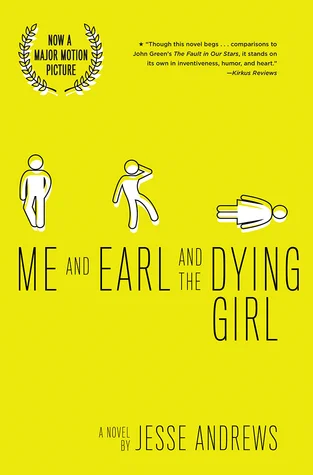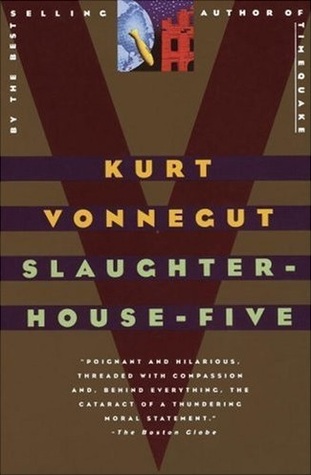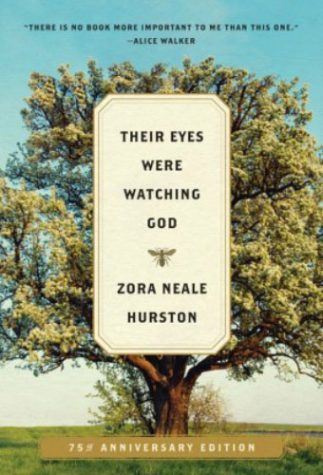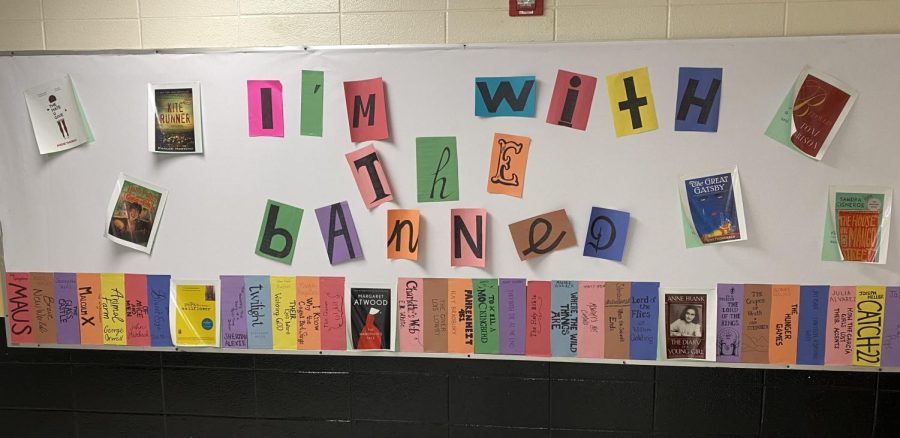Why Banning Books is Harmful
Banned Books week is September 18th through 24th!
October 14, 2022
Book banning is a phenomenon that has been taking place in schools across the United States since the 1960s. However, these attempts to ban and challenge books have become more prominent in recent years, as more books are being published and popularized containing subjects of sexuality, racial conflicts, and gender identity. Banned Books Week was created in 1982 after an exhibit was created for the BookExpo American trade show in Anaheim, California by the American Booksellers Association, where they showcased more than 500 challenged books locked in metal cages, surrounded by signs saying they were “dangerous.” The court case Island Trees School District v Pico consequently took place in 1982, after a New York school board received complaints from parents concerning books such as Slaughterhouse-Five by Kurt Vonnegut and Langston Hughes’ Best Short Stories by Negro Writers. The parents complained that these books were “anti-American, anti-Christian, anti-Semitic, and just plain filthy.” The court determined that under the First Amendment both the government and schools do not have the right to restrict students from reading certain books because they do not agree with their content.
Although the books that are challenged are determined by certain complaints within districts, many of the same novels are widely banned, much of which I have read myself. Personally, I think most of these challenged novels are banned for the wrong reasons. Whether they explicate strong language or sexual implications, concerned parents need to realize that their children will be exposed to these ideas whether they read these “dangerous” books or not.
Here are some of my personal favorite banned or challenged books that I think serve a good purpose for everyone to read:

Me and Earl and the Dying Girl has been one of the most challenged books in the last ten years, for its sexual implications and harsh language. I read this book recently, and I can understand why school boards have been advocating for taking this novel off the shelves of libraries, but its contents are nothing more than conversations I have heard walking through the hallways of my own high school. The story follows Greg Gaines, a high school senior who loves making parody movies of his favorite classics with his best friend, Earl. Not long after his senior year begins, one of his classmates, Rachel, is diagnosed with leukemia, and Greg’s mother encourages him to hang out with her to comfort her through her treatments. Though I do not think Greg is a very reliable narrator, which was intentional, I think this novel works to bring light to Rachel’s situation. Even though Rachel’s illness is not the main intent or focus of the plot, unlike books similar to this one, where the problems of the main character’s love interest have the purpose to change the outlook of the main character, Greg almost does the opposite. The intentions of his character development are clear from the start: there are none. Moreover, I think this novel has been challenged for the wrong reasons. Jesse Andrews, the author of this novel, even made a statement recently regarding a parent who advocated for taking this book off shelves in school, saying, “Every ban creates one less opportunity for a child to find a book that speaks to them and makes them fall in love with reading.” In this letter, Andrews also wrote about how many students have expressed how this book made them love reading, I think that is due to Andrews’ relatable and realistic ways of portraying his characters.

Slaughterhouse-Five falls in line with novels like To Kill a Mockingbird and The Color Purple as one of the most challenged books of all time. It has been officially banned or challenged almost a total of 20 times. In 1973, a school board in North Dakota went as far as to set fire to 33 copies in the high school’s coal burner. Alongside being one of the most banned books of all time, Slaughterhouse-Five also made it onto Modern Library’s list of the best 100 novels of all time. The story follows the protagonist Billy Pilgrim, a prisoner of war during World War II. He becomes “unstuck in time,” as a result of shell shock, causing himself to relive moments of his life over and over again. In 2011, an associate professor at Missouri State University wrote, “The ‘f word’ is plastered on almost every other page. The content ranges from naked men and women in cages together so that others can watch them having sex to God telling people that they better not mess with his loser, bum of a son, named Jesus Christ.” Almost every challenged book is brought to light because a few people did not agree with its contents, and felt that it challenged their beliefs. Barbara Jones, director of the American Library Association’s Office for Intellectual Freedom, stated in regards to Vonnegut’s writing, “Maybe people are scared of the power of good literature, I call them ‘True Believers.’ I guess people could accuse me of that too because I do have pretty strong feelings about freedom of expression.”
“All these people talk so eloquently about getting back to good old-fashioned values. Well, as an old poop I can remember back to when we had those old-fashioned values, and I say let’s get back to the good old-fashioned First Amendment of the good old-fashioned Constitution of the United States — and to hell with the censors! Give me knowledge or give me death!” Kurt Vonnegut

One of my all-time favorite books, I was surprised to see the reasons this novel was challenged. It has been challenged publicly eleven times since 2002, yet many other attempts have been filed confidentially. The Perks of Being a Wallflower is a coming-of-age story following Charlie, explicating the challenges and hardships of entering high school. In Fairfax, Virginia, this novel was challenged by an organization aptly titled Parents Against Bad Books in Schools, which argued that students should not have access to the “book’s profanity, descriptions of drug abuse and sexually explicit content.” Chbosky has even written letters to upset parents, explaining his intentions and the book’s purpose, stating that The Perks of Being a Wallflower was written to help others and to be an “end to the silence,” in regards to Charlie’s struggles with mental health while entering high school. It was even challenged as recently as this year, in Springfield, Missouri, by a grandmother of a student who has been assigned reading in class. She alleged that the book was, “pornographic,” and that she was so appalled she could not read past page 31. While this novel does deal with heavy topics like sexual assault and abortion, it is impossible to take issue with a book after only reading 31 of its 213 pages. She stated her desire for taking this book off the school’s curriculum was because she believed students who read this book would be encouraged to commit the same horrendous acts. I think this novel is supposed to do the opposite; to bring awareness to those who have experienced the unfortunate troubles that can happen in high school. Being silenced by censorship defeats the purpose of stories like this one. From my own experience, I was able to find parts of myself in Charlie, and relate to his problems and experiences. Along with Me and Earl and the Dying Girl, I do not think there are any contents of this novel that cannot be seen, heard, or experienced in any high school today. If anything, teaching novels like this in school only brings light to situations students may be experiencing, and the comfort of knowing they are not alone.

Their Eyes Were Watching God is a novel about love, realization, and feminism. It has only been banned once in 1977 for sexual explicitness. This “sexual explicitness,” is seen when 16-year-old Janie Crawford experiences a sexual awakening of true love after she witnesses a blossoming pear tree pollinated by bees in the spring. The pear tree becomes an ever-growing metaphor throughout the entirety of the novel, with Janie constantly comparing her relationships and herself to the blooming pear tree. While these scenes are described with erotic language, it is important to understand the significance of the pear tree, as it represents all of Janie’s hopes and desires in her relationships, which are never fulfilled. Janie experiences three different relationships throughout the novel. The first is an arranged marriage by her grandmother to Logan Killicks, a land owner and respected man in the community. However, he never treats Janie as his wife, and their age difference causes Janie to resent him and run away with Joe Starks to help create the town of Eatonville, where Joe later becomes mayor. Despite Janie’s attraction and admiration for Joe, it quickly becomes disheveled when he begins to belittle her in front of other people, making her seem lesser than him. After Joe dies of illness, Janie is left in Eatonville to tend to her general store. One day, while the town is busy with a baseball game, Janie stays behind to keep watch over the store. She meets Tea Cake, who challenges her to a match of checkers; a game which Joe had said she was not smart enough to play. Tea Cake makes it clear that he will work to take care of Janie and becomes her closest desire-fulfilling relationship. He treats her for the most part, as an equal, however, in a fit of jealousy, Tea Cake hits Janie to prove his control over her, yet she excuses this as she is so infatuated with him. Although her time with Tea Cake allows her to feel content in her relationship and fulfill her dreams of the pear tree, once Tea Cake passes, Janie becomes fully independent. Janie’s tale of struggle, perseverance, and feminist ideals of wanting to have control of her own life, even in her relationships.
Although I have experienced a reluctance from adults around me in regard to the material I read, I am thankful I have been given the opportunity to read and learn from these stories, and I hope others can do the same. Banning books does nothing but shield young adults from the experiences and lessons within the pages, restricting them from learning and understanding themselves and others around them. Literature teaches important lessons, acceptance, and appreciation for others. It also helps to build empathy. In honor of banned books week, read a banned book, and open your mind to possibilities you never imagined before.
“The adults are uncomfortable, and so they assume that the young people are uncomfortable. The real question is, why is discomfort a bad thing? Is being uncomfortable the same thing as being unsafe? The answer is no.” Jason Reynolds, 2020-2022 National Ambassador for Young People’s Literature.

